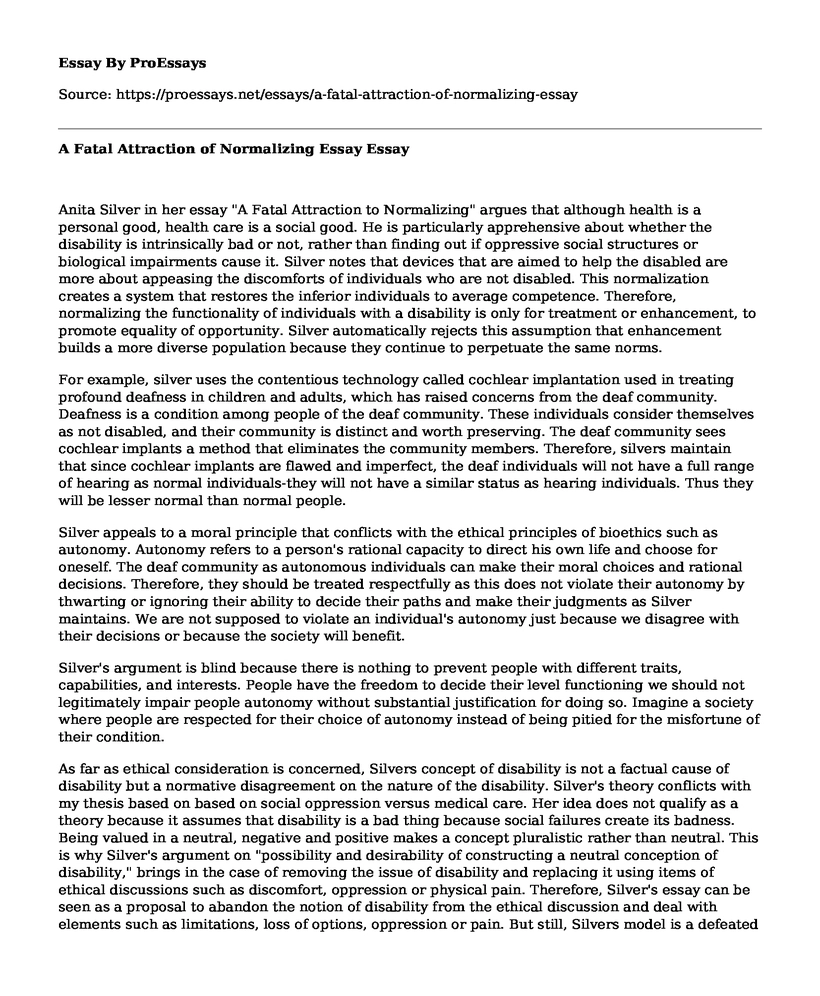Anita Silver in her essay "A Fatal Attraction to Normalizing" argues that although health is a personal good, health care is a social good. He is particularly apprehensive about whether the disability is intrinsically bad or not, rather than finding out if oppressive social structures or biological impairments cause it. Silver notes that devices that are aimed to help the disabled are more about appeasing the discomforts of individuals who are not disabled. This normalization creates a system that restores the inferior individuals to average competence. Therefore, normalizing the functionality of individuals with a disability is only for treatment or enhancement, to promote equality of opportunity. Silver automatically rejects this assumption that enhancement builds a more diverse population because they continue to perpetuate the same norms.
For example, silver uses the contentious technology called cochlear implantation used in treating profound deafness in children and adults, which has raised concerns from the deaf community. Deafness is a condition among people of the deaf community. These individuals consider themselves as not disabled, and their community is distinct and worth preserving. The deaf community sees cochlear implants a method that eliminates the community members. Therefore, silvers maintain that since cochlear implants are flawed and imperfect, the deaf individuals will not have a full range of hearing as normal individuals-they will not have a similar status as hearing individuals. Thus they will be lesser normal than normal people.
Silver appeals to a moral principle that conflicts with the ethical principles of bioethics such as autonomy. Autonomy refers to a person's rational capacity to direct his own life and choose for oneself. The deaf community as autonomous individuals can make their moral choices and rational decisions. Therefore, they should be treated respectfully as this does not violate their autonomy by thwarting or ignoring their ability to decide their paths and make their judgments as Silver maintains. We are not supposed to violate an individual's autonomy just because we disagree with their decisions or because the society will benefit.
Silver's argument is blind because there is nothing to prevent people with different traits, capabilities, and interests. People have the freedom to decide their level functioning we should not legitimately impair people autonomy without substantial justification for doing so. Imagine a society where people are respected for their choice of autonomy instead of being pitied for the misfortune of their condition.
As far as ethical consideration is concerned, Silvers concept of disability is not a factual cause of disability but a normative disagreement on the nature of the disability. Silver's theory conflicts with my thesis based on based on social oppression versus medical care. Her idea does not qualify as a theory because it assumes that disability is a bad thing because social failures create its badness. Being valued in a neutral, negative and positive makes a concept pluralistic rather than neutral. This is why Silver's argument on "possibility and desirability of constructing a neutral conception of disability," brings in the case of removing the issue of disability and replacing it using items of ethical discussions such as discomfort, oppression or physical pain. Therefore, Silver's essay can be seen as a proposal to abandon the notion of disability from the ethical discussion and deal with elements such as limitations, loss of options, oppression or pain. But still, Silvers model is a defeated paradigm of disability that remains as an individualistic framework.
Cite this page
A Fatal Attraction of Normalizing Essay. (2022, May 15). Retrieved from https://proessays.net/essays/a-fatal-attraction-of-normalizing-essay
If you are the original author of this essay and no longer wish to have it published on the ProEssays website, please click below to request its removal:
- Thyroid Function Testing in Women Who Had a Stillbirth
- Critical Infrastructure Security Emergency Management: An Assessment of Richmond-Virginia International Airport
- Paper Example on Nursing Staff Education in Reducing Falls as Compared to Bed Alarm
- Primary Interventions: Disease Prevention and Health Promotion Essay
- Essay Sample on Reproductive System Disorders
- Affordable Care Act and Patient Advocacy Essay Example
- Measles Outbreak: A Global Disease's Impact on Ohio - Essay Sample







